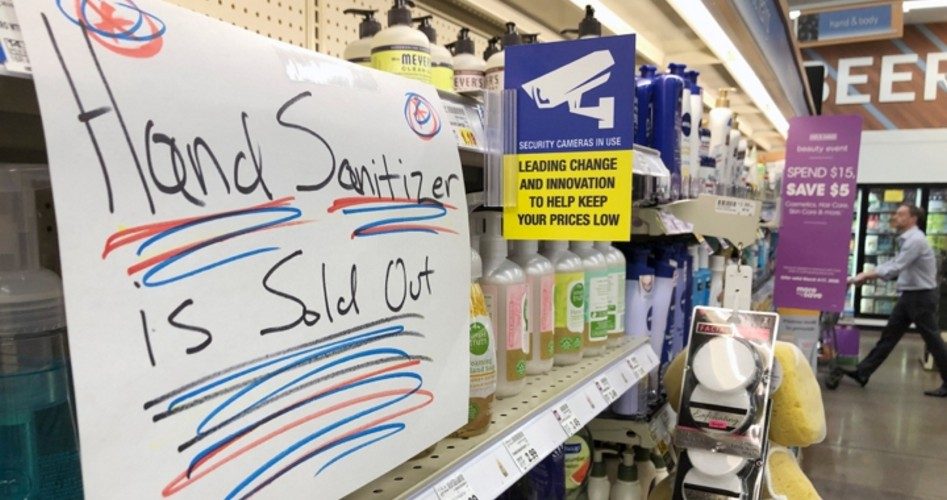
The increasing spread of SARS-CoV-2, the novel coronavirus now impacting the world, has led to what the media reports as “panic buying” nationwide in big box stores such as Costco and Walmart. According to many reports, customers are flocking to stores to clean out the shelves of items like toilet paper, disinfectant, and some non-perishable food items.
Not surprisingly, this has led some commentators to criticize “preppers” and “hoarders.” It has also led some commentators to warn retailers that they should not engage in price gouging.
It’s not just the media, either. State governments are getting into this as well. On March 4, California Attorney General Xavier Becerra, a former Democrat member of Congress, warned that “Californians shouldn’t have to worry about being cheated” during the outbreak by retailers who are raising prices. Any citizen seeing that behavior should report it.
“I encourage anyone who has been the victim of price gouging, or who has information regarding potential price gouging, to immediately file a complaint through my office’s website,” Becerra wrote.
Meanwhile, in Los Angeles, price gouging laws have entered into effect. Taking to Twitter, Los Angeles City Attorney Mike Feuer warned: “With a healthcare emergency declared in LA, PRICE GOUGING laws take effect. It is now illegal for any consumer good or medical supply to be sold for more than 10% higher than it was before the emergency was declared.”
?With a health emergency declared in LA, PRICE GOUGING laws take effect.
It is now illegal for any consumer good or medical supply to be sold for more than 10% higher than it was before the emergency was declared.
If you are a victim, call us: 213-978-8340 #CoronaAlert https://t.co/Onmlpu0y2s
— LA City Attorney (@CityAttorneyLA) March 4, 2020
Hoarders, meanwhile, shouldn’t hoard, according the press. “Keep calm and stop hoarding,” said the lead sentence of an article on the subject from USA Today.
These reactions are the polar opposite of what should be allowed to happen in a true market economy. Under conditions of freedom, such as should prevail in our erstwhile constitutional republic, people should be able to choose how to allocate their resources however they like. If they feel that they should stock up on toilet paper, Purell, chicken soup or any other good, they should do so. If that results in rapidly increasing demand for those or other products, then the prices for those products should rise if supply is not equivalent to demand. This is basic economics in a free market.
In the case of such activity within a free market, the higher prices signal to suppliers that an excess of demand exists, which means that there is an opportunity to sell additional supply into that market. The higher prices will bring in new market entrants. That will increase supply, and prices will again decrease to a new equilibrium level as a result. Importantly, especially in times of crisis, this will mean that long-term, sometimes devastating shortages, will be avoided.
We already see this happening now with regard to surgical masks. The BBC has reported that “Japanese electronics giant Sharp is to use a TV factory to make surgical masks amid the coronavirus outbreak.” The company is converting a factory that normally makes LCD panels to mask production.
“Sharp’s production line in Mie, east of Osaka, usually makes LCD panels for its television business,” the BBC noted, “but could soon ramp up to making as many as 500,000 masks a day by switching part of its production.” In China, Foxconn, another giant electronics firm, is also going to begin to produce masks, the BBC also reported.
The alternative to this market action is for government bureaucrats to control production and distribution of goods and services. But government bureaucrats have no incentive to produce anything. And if they do produce something, they have no incentive to produce efficiently. They also have no incentive to distribute either efficiently or equitably. History has proven that whenever government has tried to get into the business of producing and distributing it has failed miserably even under normal economic conditions. Anyone unfamiliar with this phenomenon should spend a moment to look up the history of shortages in the Soviet Union.
Further, anti-gouging price caps will put a straightjacket on the market’s ability to counter coronavirus shortages. If price caps mean that manufacturers and retailers can not sell products at a profit given the increased costs they themselves are likely to incur due to supply chain, employment and other potential constraints, then it will not make sense for them to increase production of badly needed goods and services. The “feel good” policy of fighting “price gouging” will then have the impact of artificially reducing the availability of goods and services that may be badly needed.
As with almost everything having to do with the coronavirus outbreak, many of the worst outcomes that could come to pass are not actually attributable to viral biology but to the reaction of government authorities to the pandemic.
In the meantime, freedom-loving Americans should ignore the statists in the media and elsewhere and take personal responsibility for themselves and their families, continuing to employ their resources as they see fit.
Photo: AP Images



